The Intel Broadwell Review Part 2: Overclocking, IPC and Generational Analysis
by Ian Cutress on August 3, 2015 8:00 AM ESTProfessional Performance: Windows
Agisoft Photoscan – 2D to 3D Image Manipulation: link
Agisoft Photoscan creates 3D models from 2D images, a process which is very computationally expensive. The algorithm is split into four distinct phases, and different phases of the model reconstruction require either fast memory, fast IPC, more cores, or even OpenCL compute devices to hand. Agisoft supplied us with a special version of the software to script the process, where we take 50 images of a stately home and convert it into a medium quality model. This benchmark typically takes around 15-20 minutes on a high end PC on the CPU alone, with GPUs reducing the time.
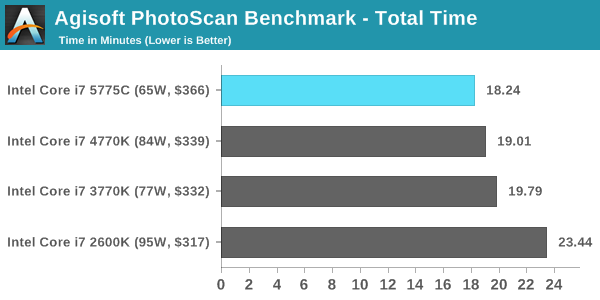
Cinebench R15
Cinebench is a benchmark based around Cinema 4D, and is fairly well known among enthusiasts for stressing the CPU for a provided workload. Results are given as a score, where higher is better.
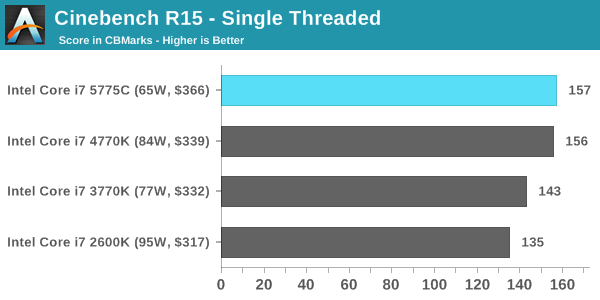
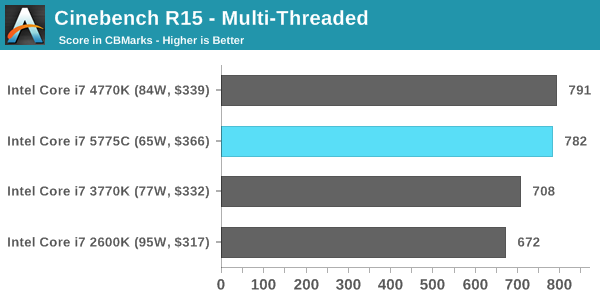
HandBrake v0.9.9: link
For HandBrake, we take two videos (a 2h20 640x266 DVD rip and a 10min double UHD 3840x4320 animation short) and convert them to x264 format in an MP4 container. Results are given in terms of the frames per second processed, and HandBrake uses as many threads as possible.
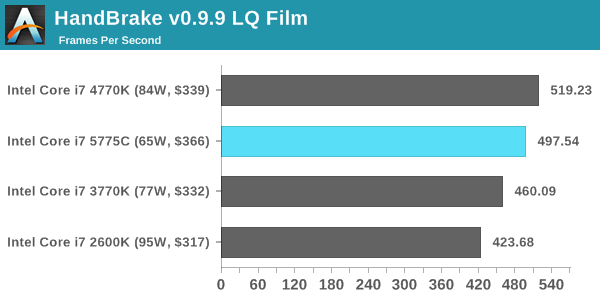
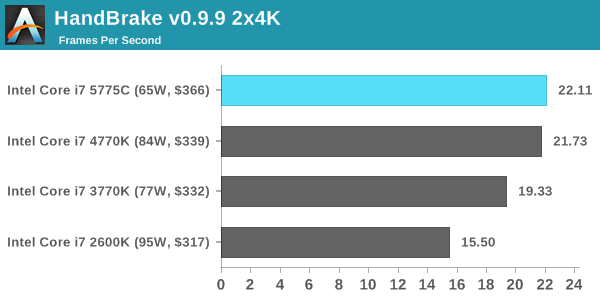
Hybrid x265
Hybrid is a new benchmark, where we take a 4K 1500 frame video and convert it into an x265 format without audio. Results are given in frames per second.
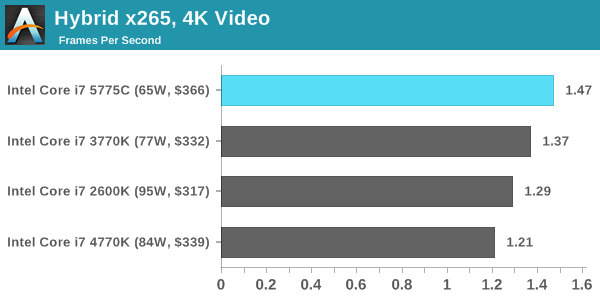










121 Comments
View All Comments
Pissedoffyouth - Monday, August 3, 2015 - link
Can the integrated GPU overclock well? The reason I ask is I have a very micro PC currently with an A10-7800 and I'm looking at getting this badboy to replace itderuberhanyok - Monday, August 3, 2015 - link
you'd have to find one for sale, first.zepi - Monday, August 3, 2015 - link
At least in Europe these are relatively easy to come by in retail.hmind - Wednesday, August 5, 2015 - link
Hey, the answer will more than likely be no, i see no oc tools for igpu overclocking in my pc's z97 bios and my testing on older an intel hd 4600 igpu yeilded no results so i do doubt intel will unlock the igpu, if you can just hold out for the next big apu launch or skylake or get faster ram (which will easily allow the 7800 to catch this chip up if you can get a 2400 mhz kit since kaveri gains a lot from better ram) then you will be sitting pretty, im also sure you can overclock amd igpu's no matter whether or not the cpu is locked so if you haven't already tried it do that.deruberhanyok - Monday, August 3, 2015 - link
Fantastic article! I know more than a few people who will be happy to see there's still no compelling performance reason to upgrade their Sandy Bridge systems. Talk about getting extra bang for the buck!Any chance you might be able to do a quick follow-on post and throw some Nehalem numbers in there? I'm sure there's a few first-gen Core i7 owners wondering if it's worth the upgrade now, or to try and hold off for Skylake.
On a side note, does anyone know when we'll actually be able to buy these Broadwell processors?
Glock24 - Monday, August 3, 2015 - link
Would be nice to have a similar comparison for mobile CPUs, and even more so a comparison of generational improvements of mobile integrated graphics.Marburg U - Monday, August 3, 2015 - link
Still no reason to retire my Q9550@4.8.Marburg U - Monday, August 3, 2015 - link
err: of course it's 3.8.extide - Monday, August 3, 2015 - link
What would you consider worth upgrading for then? I mean a moderately overclocked modern cpu could easily be twice as fast as your setup, not to mention the numerous platform upgrades since...I mean sure, the Q9550 may be fast enough to not be a dog, but there certainly is a lot to be gained...
lukarak - Tuesday, August 4, 2015 - link
But to be gained for what? Back in the day, you had to upgrade, because new content formats were emerging. I distinctly remember buying a PC every two years in the 90's early 00 period. I had a 386, then a 486, then a Pentium 166 (no MMX :), Celeron 333, Athlon 1100, Athlon x64 3200+. The reason I upgraded was the new content. MP3s, DVDs, XviDs, MKVs. All of them weren't able to be played on some of these systems. There was a reason to invest. The i7-920 system I have now for 6.5 years is still going. Sure, there are games, and there is 4k, but 4k is not the jump HD was over DVDs. There just comes a point where you don't notice. Like with smartphones, 150 to 300 ppi, night and day. 300 and 5xx ppi? Not so much. There's just no reason to upgrade if not for numbercrunching or gaming.